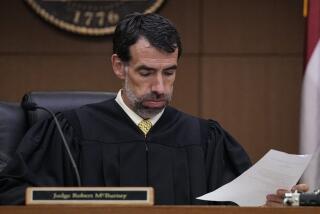Election Remedies Not Enough, Florida Is Told
- Share via
WASHINGTON — The U.S. Commission on Civil Rights strongly urged Florida election officials on Friday to remedy procedural ills that it says plagued minority voters in November’s presidential election. The panel added that it would monitor the state’s progress during its current legislative session.
Florida Gov. Jeb Bush’s call to upgrade voter technology does not solve the procedural problems that made it difficult for many voters to cast ballots, the commission said. Bush earlier this week urged state lawmakers in Tallahassee to create uniform ballots and to upgrade voting technology--measures recommended by a bipartisan state task force.
“It only solves half the problem,” the commission’s vice chairman, Cruz Reynoso, said in an interview.
Citing a poorly administered voter sign-in system, physical barriers and inadequate resources at many polls, the commission’s statement called for Florida officials to “promptly resolve these major problems that occurred on their watch.”
Voting irregularities in Florida were highlighted during more than four chaotic weeks of recounts and legal maneuvering in the contested 2000 presidential election.
Although the commission can hold public hearings and issue reports on election irregularities, it does not have the authority to require specific changes.
“We can’t make them do anything, but we can embarrass them and make them tell the public what they are doing,” committee chairwoman Mary Frances Berry said.
More than 100 registered Florida voters, election experts and public officials testified in January and February during two commission hearings--called after complaints of voting irregularities and civil rights violations during the Nov. 7 election.
There were allegations that voters--many of them black--were intimidated by police roadblocks, were asked for several forms of identification at the polls and were incorrectly identified as felons.
In a letter this week to Bush, Berry also called for Florida officials to find a way to help ensure that the resources allocated to voting equipment and procedures are more evenly distributed from county to county.
In a news release Friday, Bush responded that the commission “has yet to be presented with any evidence of intentional discrimination in the conduct of the Nov. 7, 2000, election in Florida.”
But Berry said that discrimination does not need to be intentional to be illegal under voting rights laws.
“Discrimination which may be unintentional but results in a disproportionate number of persons who are excluded from the right to vote is still illegal,” Berry said. “If someone ran over you and killed you, it doesn’t matter whether they intended it or not. You are still dead.”
Bush said in his statement that “the commission failed to give any appropriate Florida official an opportunity to discuss or respond” to the commission’s concerns.
Berry said the commission had already heard from Florida officials during the hearings.
Two commissioners voted against endorsement of the statement. Commissioner Abigail Thernstrom, the panel’s only Republican, said the commission was “jumping the gun” and should have given other officials a chance to respond before issuing the statement.
“I do not understand rushing to judgment in a very complicated matter,” she said.
More to Read
Sign up for Essential California
The most important California stories and recommendations in your inbox every morning.
You may occasionally receive promotional content from the Los Angeles Times.













